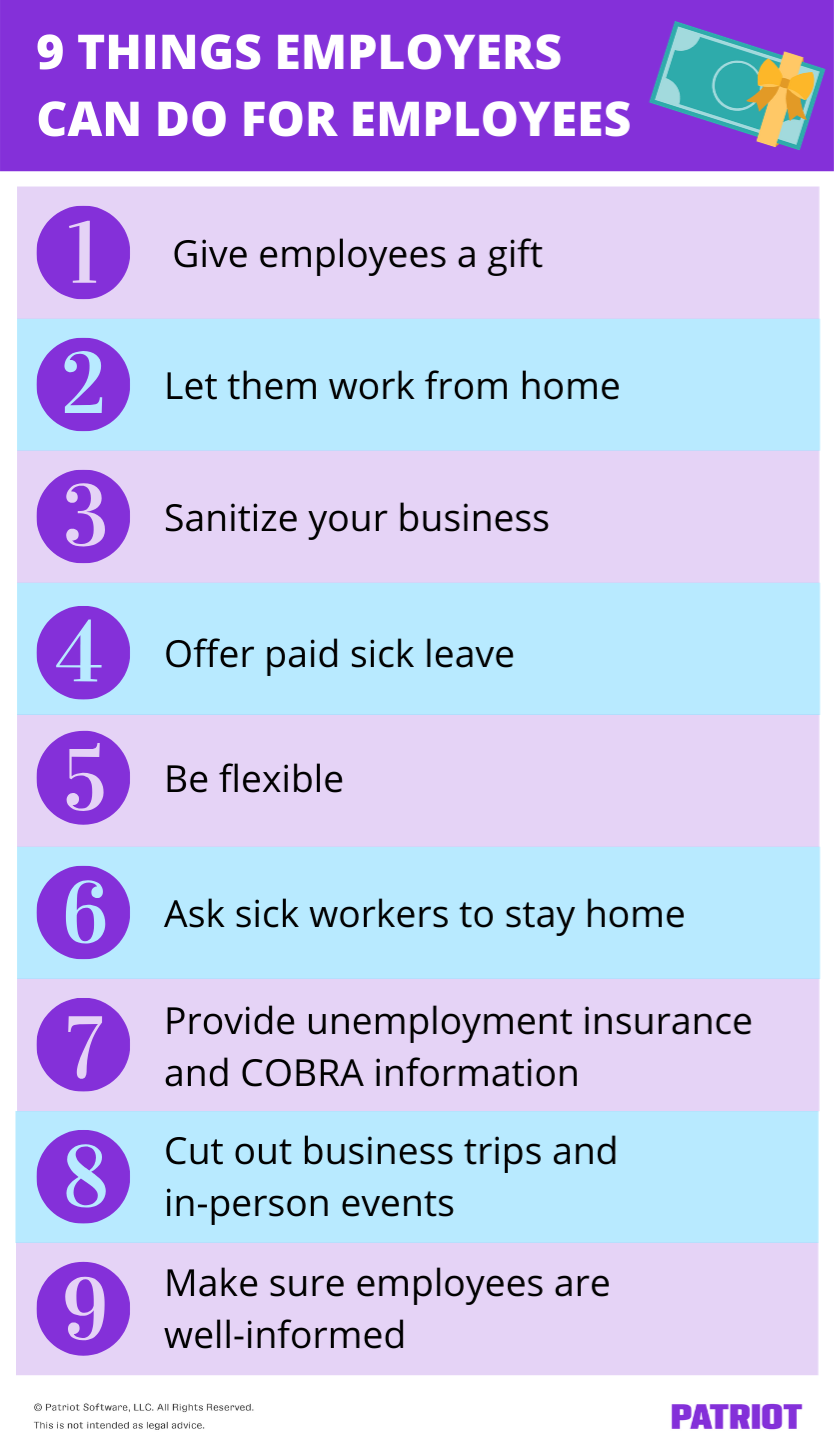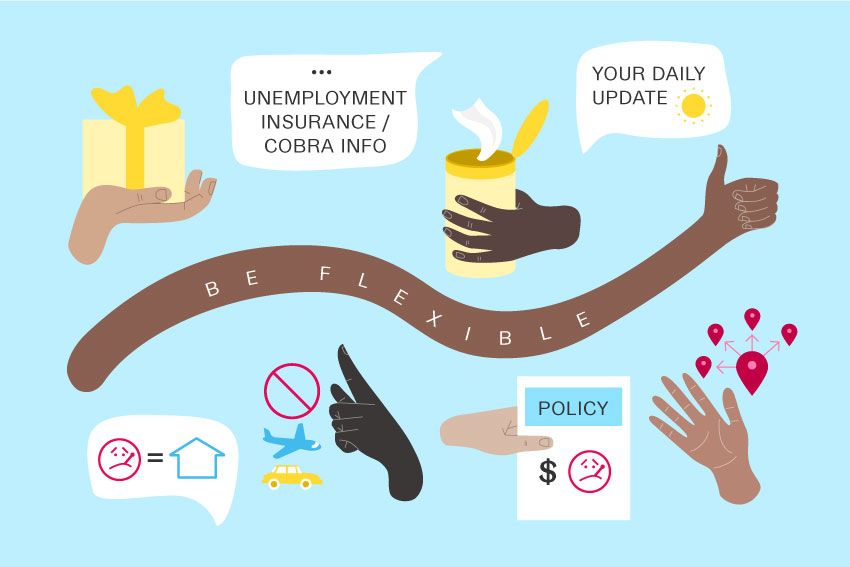Have you been closely following the U.S. government’s response to the escalating coronavirus situation? If so, you know that the government is working quickly to provide worker and small business relief.
As an employer, you can also take matters into your own hands to keep your workers safe and financially sound.
9 Things employers can do for employees during coronavirus
As the leader of your small business, there are a number of things you can do to comfort your employees.
Whether you have to make tough decisions or have the means of helping your workers, here are some things you can do for your employees during this pandemic.

1. Give employees a gift
Nationwide, business as normal has come to a screeching halt as some states close down restaurants and bars to dine-in customers, movie theaters, and schools.
As a result, businesses are having to adjust. For example, some restaurants are offering delivery and carry-out options in lieu of dine-in service. And, that means employees are likely losing shifts and missing out on tip income.
On the flip side, some businesses are having to go into overdrive as product demand increases (e.g., hand sanitizer).
If you’re looking to lift your employees’ spirits during this tough time, you might consider giving them a gift.
Some gift ideas include:
- Money
- Gift cards
- Care packages (e.g., food, sanitation supplies, etc.)
If you decide to give your employees a cash-value gift, remember that you must withhold taxes from it. You might decide to do a tax gross up for payroll to give employees a specific amount (e.g., $150).
When you gross up for taxes, you increase the employee’s gross wages to account for taxes. That way, the employee’s take-home pay is a neat, even number.
Whatever you are able to give your employees could go a long way.
2. Let them work from home
The fast spread of the coronavirus has forced businesses nationwide to shift to a remote work model. This lets employees continue working while also staying isolated.
If you’re able to give employees this benefit, do so. The coronavirus is spreading at an alarming rate, causing the Centers for Disease Control and Prevention (CDC) to urge people to avoid close contact with others and self-quarantine if they have been exposed to the virus.
And on March 16, the White House advised working from home “whenever possible.”
Many businesses are making adjustments and putting plans into motion to enable their employees to work through the coronavirus pandemic from the comfort of their homes. If giving your employees the ability to work remotely is something in your wheelhouse, create a policy and distribute the necessary equipment.
Of course, not all business models are going to be able to switch to company-wide remote work. And if you absolutely cannot let employees work from home, you must…
3. Sanitize your business
For your employees’ sake (and yours), you must clean and disinfect your business regularly—at least once a day.
You can follow CDC guidelines on cleaning and disinfecting surfaces during the pandemic, which include best practices such as:
- Wearing disposable gloves during cleaning and immediately washing hands after
- Using detergent or soap and water before disinfecting dirty surfaces
Also, be sure to use approved coronavirus-fighting products when disinfecting your small business.
4. Offer paid sick leave
Do you already offer your employees paid sick time? Great! For those of you who don’t, you might consider providing paid time off for your employees during the coronavirus. And based on new legislation, some employers may have no choice when offering paid sick leave.
By offering paid sick leave to employees, you can ensure your employees don’t have to choose between infecting the office and missing a paycheck.
On March 18, the Senate passed the Families First Coronavirus Response Act, and President Trump signed the package into law. The bill requires employers to provide 14 days of paid sick leave (at the employee’s regular rate of pay, capped at $511 per day per employee) to employees who have or are being tested for coronavirus. Employees are also eligible if a government official or doctor tells them to stay home due to symptoms of or exposure to the coronavirus.
The law also has a provision requiring employers to provide paid leave benefits (at a rate of two-thirds the employee’s regular rate of pay) for up to three months. However, this benefit is limited to $200 per day per employee. Employees who have to stay home with a child whose school or childcare facility is closed because of coronavirus would be eligible.
To help employers cover mandatory paid sick leave costs, there’s a provision that provides an employer tax credit, which is equal to 100% of the sick pay you offer during this time.
The paid leave benefits law applies to all employers with fewer than 500 employees. The Department of Labor can exempt businesses with fewer than 50 employees from providing workers with paid sick leave. Businesses with more than 500 employees are excluded from providing mandatory paid leave. However, exempt businesses can still opt to offer employees paid sick leave during the crisis.
5. Be flexible
Another gift you can give employees during the coronavirus crisis is being a flexible employer.
Employees ‘round the country are struggling to make ends meet and take care of their children due to the coronavirus. And with half of the schools across the U.S. closing down temporarily, working parents are scrambling to figure out what to do with their children.
To help your employees during the outbreak, be understanding about their needs and flexible when offering arrangements. So, what can you do to offer flexibility during this pandemic? To help your employees out, you can work around their schedules or establish a flextime policy, if possible.
Offering flexibility during this trying time not only helps your team out, but also shows your employees that you care about their health and needs.
6. Ask sick workers to stay home
According to a SHRM study, 9 out of 10 workers admit to going to work while they’re sick. With the coronavirus spreading like wildfire, more employers are beginning to ask employees to take time off or work from home if they’re sick—regardless of what symptoms they have. Not to mention, the CDC is urging sick workers to stay home.
To stop the spread of the virus and protect employees company-wide, consider asking sick workers to stay home if they don’t feel well. You can request that ill employees work from home or use PTO if they aren’t feeling well enough to work.
Some individuals can also carry the virus and have no symptoms. Because of this, it may be a good idea to also require employees to work from home or use PTO if their spouse, child, or roommate is sick.
7. Provide unemployment insurance and COBRA information
Due to the pandemic, many small businesses are seeing a decrease in profits. Because business owners are taking a huge hit, many are looking for ways to cut down expenses, like letting employees go.
If your business has been negatively impacted by the virus and you have to make cuts, provide unemployment insurance and COBRA information to affected employees.
Unemployment insurance provides certain benefits to eligible workers who are unemployed at no fault of their own. In this case, coronavirus would cause the unemployment. On the other hand, the Consolidated Omnibus Budget Reconciliation Act (COBRA) allows employees, covered spouses, and dependents to continue their group health insurance coverage if they become ineligible for your business’s plan.
If your business offers COBRA coverage and needs to let some of your staff go, be sure to inform impacted employees about COBRA details. And, let affected employees know how they can apply for unemployment benefits through the state.
Include information about both COBRA (if applicable) and unemployment insurance in your employee handbook. That way, you can guide employees on where to find COBRA- and unemployment-related information.
Keep in mind that your state may provide a special mass-layoff number (e.g., 1234567) for you to use for coronavirus-related layoffs. This can speed up the process so your employees can receive unemployment insurance benefits sooner. Not to mention, it also may prevent your employer account from being affected.
8. Cut out business trips and in-person events
Many states have temporarily banned mass gatherings to help prevent individuals from spreading the disease. And, the CDC is advising against gatherings of 50 or more people to slow the spread. Not to mention, the White House is advising against social gatherings of more than 10 people.
To follow suit and keep your employees safe, consider temporarily cutting out in-person events, such as:
- Meetings
- Conferences
- 1:1s
Instead of having in-person events, you can either reschedule them or take advantage of video conferencing tools to have weekly discussions and host meetings (e.g., Google Hangouts).
If your employees travel for work, consider also temporarily “banning” business trips, especially if they’re planning on traveling to a highly-infected area (e.g., Washington or New York state).
9. Make sure employees are well-informed
Last but surely not least, in the hype of the coronavirus, be sure to keep your entire team well-informed about emerging virus information.
As an employer, you should be doing your homework daily to find out what kind of coronavirus-related restrictions your state and the government has put in place. And, try to keep up with the CDC and visit its website each day for updates.
To keep employees in the loop about the coronavirus and how it impacts your workplace, you can send out daily emails or memos, chat employees, or host virtual meetings.
Regardless of what method you choose, you must keep your employees posted about COVID-19 details and your workplace’s virus-related policies (e.g., work from home policy).
Patriot Software has been providing constant communication to employees during this pandemic. We’ve put together an article, chock-full of our internal coronavirus communications and templates, to share with other business owners.
This is not intended as legal advice; for more information, please click here.
These views are made solely by the author.
